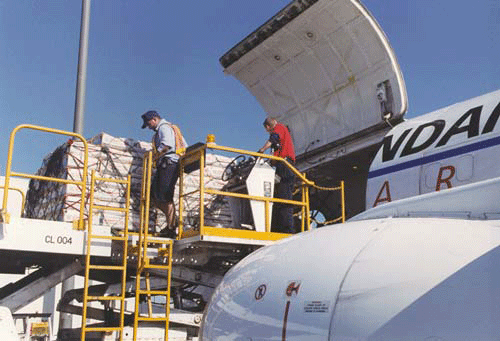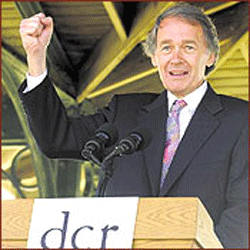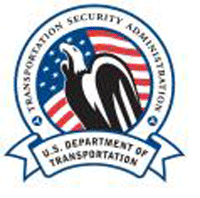Closing
Cargo Security Loopholes

Should
the Department of Homeland Security’s Transportation Security
Administration (TSA) require a carrier to inspect cargo traveling
on passenger flights? Industry and government officials continue
the debate within the halls of Congress.
 Congressman
Ed Markey (D-MA), a senior member of the Homeland Security Committee
for the United States House of Representatives, has once again raised
the inspection issue by introducing legislation seeking to “close
loopholes in Aviation Security.” The proposed Strengthen Aviation
Security Act (H.R. 2649) seeks, among other things, to phase in
full inspection of cargo flown on passenger flights within three
years. Congressman
Ed Markey (D-MA), a senior member of the Homeland Security Committee
for the United States House of Representatives, has once again raised
the inspection issue by introducing legislation seeking to “close
loopholes in Aviation Security.” The proposed Strengthen Aviation
Security Act (H.R. 2649) seeks, among other things, to phase in
full inspection of cargo flown on passenger flights within three
years.
Congressman Markey’s previous
attempts to pass similar legislation (Air Cargo Security Act - H.R.
2044) or to incorporate cargo inspection requirements as amendments
to larger bills (House’s Authorization for Department of Homeland
Security - H.R.1817) have been unsuccessful.
Currently, the TSA requires random
inspections of cargo carried on passenger flights within, into,
or out of the United States. The inspections are conducted by domestic
or foreign air carriers under the supervision of the TSA.
In November 2003, the TSA ordered
random security inspections as an interim step in the implementation
of the TSA’s broader strategic plan to secure the air cargo
supply chain. The awaited TSA plan likely will incorporate recommendations
made by the TSA’s Security Advisory Committee and the Department
of Transportation’s Office of the Inspector General. The recommendations
include:
• Strengthening the Known Shipper Program;
• Using new technology to profile and inspect cargo;
• Enhancing regulation of indirect air carriers; and
• Strengthening security for all-cargo aircraft.
The TSA is expected to unveil its
strategic plan by the end of September. Also factoring into the
strategic plan is the TSA’s assessment of the viability of
using Explosive Detection Systems (EDS) or other systems to detect
threats in air cargo. |
 Readers
may recall that last year the TSA received $55 million to conduct
an assessment of EDS. Readers
may recall that last year the TSA received $55 million to conduct
an assessment of EDS.
The proposed “Strengthen Aviation
Security Act” has been referred to the House Subcommittee
on Economic Security, Infrastructure Protection and Cybersecurity.
The bill is co-sponsored by Congresswoman Nita M. Lowey (D-NY).
The Coalition of Airline Pilots Associations, a trade organization
that represents pilots who fly for American Airlines, United Parcel
Service, ABX Air, Southwest Airlines and Airtran Airways, is a strong
supporter of the bill.
Detractors of the bill, in government
and industry alike, claim that this and similar legislation is cost
prohibitive as it slows down a shipping process which is fundamentally
based on saving time. Additionally, detractors believe that the
profiling of cargo and strengthening of the Known Shipper Program
is a cost effective solution to this security concern and that a
100% cargo inspection process is unnecessary.
Similar debates involving the inspection
of passenger baggage arose after the Pan Am/Lockerbie and TWA flight
800 disasters. Some industry experts lobbied that a 100% passenger
baggage inspection requirement was too onerous on passengers and
airlines. One of the early systems developed to implement 100% baggage
inspections required passengers to submit to inspections (x-raying
and hand searches) upon entering an air terminal and prior to check-in.
The process was cumbersome, time consuming, and failed miserably
from a customer service viewpoint. This failure, however, resulted
in the improved use of technology to streamline the process. Now,
about a decade later, passenger baggage inspection is second nature
in the industry.
The process advances occurred mainly
because the government instituted stronger security requirements
and the traveling public demanded better customer service. The pressure
forced airlines and industry security experts to develop efficient,
safe and cost effective solutions to provide a 100% passenger baggage
inspection process. With this success in mind, can the government
afford not to require implementation of a 100% cargo inspection
process on passenger flights over the next three years?
With 22% of all air cargo being transported
on passenger aircraft, this issue deserves debate but without government
action and a public demand for additional safeguards it appears
Mr. Markey’s bill may remain just a bill.
mholland@condonlaw.com |
| |
Call
For Bifurcated Cargo
“The
tragedy of Hurricane Katrina sends yet another urgent message to businesses
that they need to protect their supply chains against catastrophic events
that disrupt the normal flow of their global inventory,” Ted Scherck,
President, The Colography Group, Inc said at Delta Nu Alpha’s 2005
National Education Conference in Milwaukee, Wisconsin.
“In the weeks and months to come, however, companies that have not
already done so should take a long, hard look at how their supply chains
are constructed so they can cope with future incidents that threaten to
cut off their inventory.”
“The Colography Group’s “bifurcated” distribution
model uses mathematical formulas to calculate a product’s value
relative to the transportation needed and determine if the goods can afford
to sit in inventory or if they should move from shipper to consignee as
quickly as possible.
“High-value commodities subject to rapid obsolescence should not
be resting as inventory in warehouses, and thus should be produced, fulfilled
and shipped with rapid turnaround,” Scherck said. “But there
are goods of lower value with reduced time-sensitivity that don’t
demand such expedited distribution.
“Businesses shipping and distributing around the world need to strike
a balance so they can check increases in inventory-carrying costs while
maintaining frictionless delivery flows in normal times and during times
of crisis.”
More info: www.colography.com.
The word “bifurcated means divided or made up of two parts.
We had a good friend named Al Collins who everybody called “Jazzbeaux.”
He is gone now, but at one time he was “The Milkman” on the
all night radio show on WNEW-AM in New York City.
Sometimes Jazz would get the audience into the music (big band & Jazz)
by saying:
“Now I am gonna majuberate a new group of selections, that you will
love.”
Too bad Al never heard this word “bifurcate”.
I just know he could have used it for something.
In any case I have been majuberated ever since the last time Jazz and
I stayed up all night playing big band music. (Geoffrey)
|



